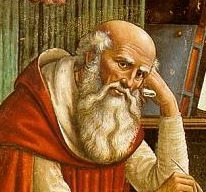So, my 'blog has been much neglected of late, for which I am very sorry. If I may be so bold as to offer excuses, I have been in an intensive Arabic course, and my wife has been pushing to purchase a house. Add to that my calling as the First Counselor in the
Young Men's Presidency and my position in the ward's
Boy Scout troop, and equals out to: I've had a busy Summer. It has been really good, make no mistake of that, but it has not lent itself to activities such as writing, either on this 'blog, or on any other medium. I've had some occasion to think on topics both fantastic and mundane, but have had no occasion to set to it. This is, of course, nothing new. I am now, perhaps attempting to set to something, both for my own benefit, and perhaps for yours. It is a funny thing, considering how ephemeral writing on the Internet seems--even Internet writing is somehow more permanent than never writing at all. As my good friend Matt indicated once, however, the impetus to not write is often very great. We soldier on, though. We soldier on.
Unlike my ordinary essays, I have no clear topic tonight. This is contrary to custom, but the desire to write out-weighed the fear of appearing foolish. Of course, I often appear the fool when I have a topic, so it is clear that having no topic is no defense against silliness. I suspect that there is no true defense against foolishness. Perhaps time and age.
I've been reading Professor Tolkien again. As you know from some of my previous
posts, my life has been great influenced by
Tolkien's life and works. The intellectual and philosophical basis of this
'blog is derived ultimately from his articulation of sub-creation. It is therefore always a joy to read from his works. I have been working my through
The Lord of the Rings again, albeit slowly, since I started after Christmas and have only just finished
The Two Towers. This was part of a pact which I formed with my Uncle, Master and fellow Inkling (who has been discovering other
skills) to begin again. It has been a lot of fun reading Tolkien again, although it has been also somewhat intimidating. I have always kicked around the idea of being a writer and long-time friends have been aware on at least some level that I am a
fabulist, in that I create fantasy worlds. My fantasy lacks the mythic grandeur that gives Middle Earth so much of its strength. I was not as well-versed in Myth when the first inklings of
Henryon came about as I am now, so it is perhaps unsurprising, but one of the things which surprises me about
Henryon is how pedestrian it is. It is fantastic, but it is not usually very epic--and it is never mythic. This is not a complaint. I am not trying to write
The Lord of the Rings.
Henryon is what it is, and is solely mine, but it is interesting, that, given my influences, it should be so down-to-earth--for a fantasy world.
This set me to thinking about influences. I've observed previously that you can tell much about Jack and Prof.
Tolkien's education and linguistic leanings by the way their stories and fantasy worlds develop. Their influences are clear. My influences are also clear--in fact if you were to do an
intellectual history of the development of
Henryon (or any of my other projects) you would be able to discern elements from my outside life and education which were then bled into my
fabulism. It has always been thus, for
fabulism is, in some ways, part of how I order the world--my own personal foundation myth--which is why
Henryon is, in particular, so idiosyncratic. I read, and know people, who dream of getting their fantasy novels published. I harbour no such ideas, for
Henryon is therapy. Nobody wants to read my therapy. I think it interesting (else I wouldn't spend so much time on it) but there is a difference between interesting and worth reading. In terms of writing for others, whether academic or fantastic, it ultimately doesn't matter whether the author likes it or not, for he is not the one reading it. So, I don't write for others (not that I actually write fiction--no, I usually write notes on cultural and historical elements of the fantasy world, rather than actual fiction. This is in part because all of my training and disposition inclines in this direction, and partly because writing believable dialogue is hard).
This 'blog falls into a strange middle ground, for it is written for others. That is why I hunger for comments so, for without consumers this 'blog is the same as all of the rest of my writings, but since these writings are actually published, after their fashion, they clearly serve a different purpose, which purpose is clear: to feed my enormous ego. 'Blogging, all 'blogging, is a symptom of raging egoism, a disease which is rampant all over the Internet. I am not at all immune to it, as this 'blog clearly indicates (although anyone who knows me well will no doubt observe that 'blogging is the least symptom of my egoism). Because the purpose of this 'blog is to feed my ego, I must choose topics that spark agreement or at least generate intelligent discourse, thus further increasing my ever-growing confidence in my own vain intellect. In fact, once I wrote a 'blog post where I felt that my ego was not being properly fed, and I near swore off 'blogging entirely. The hunger of my ego was sufficient to keep me 'blogging, clearly, but it was a close fought battle. Still, I learned to choose my topics more carefully, lest somehow I am again mistaken, and my ego suffers such a blow that it never recovers, and I am forced to give up 'blogging and begin a quest to either restore my ego to its proper over-blown place, or else develop true humility.
Real-life virtue or virtual vices. Such a difficult decision.

